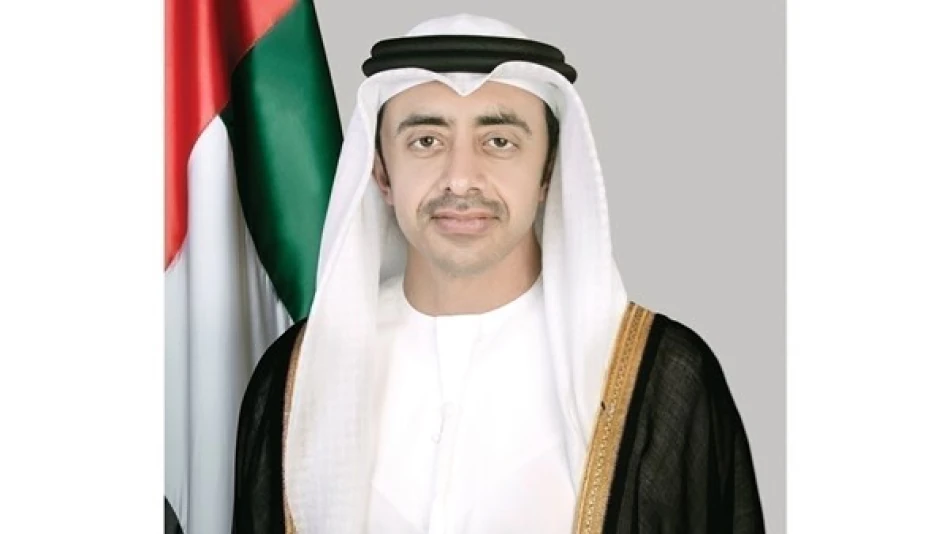
UAE Condemns Israel's Reckless Attacks, Warns of Dangerous Regional Escalation
UAE Condemns Israeli Attack on Qatar as Regional Security Crisis Deepens
The United Arab Emirates has issued its strongest condemnation yet of Israel's strike on Qatari territory, marking a significant diplomatic moment as Gulf states unite against what they view as escalating Israeli aggression. The attack, which targeted Hamas political bureau members in Doha and killed a Qatari security officer, represents a dangerous expansion of Israel's military operations beyond traditional conflict zones into the heart of the Gulf region.
Unprecedented Gulf Unity Against Israeli Operations
UAE Foreign Minister Sheikh Abdullah bin Zayed Al Nahyan delivered an unusually sharp rebuke, calling the Israeli strike "blatant and cowardly" while emphasizing complete solidarity with Qatar. This response is particularly noteworthy given the UAE's normalization of relations with Israel through the 2020 Abraham Accords.
The foreign minister's statement went beyond typical diplomatic language, describing the attack as a "flagrant violation of Qatar's sovereignty" and a "serious assault on international law." Such forceful rhetoric from a nation that maintains diplomatic ties with Israel signals the gravity with which Gulf states view this escalation.
Breaking Diplomatic Norms
Dr. Anwar Gargash, diplomatic advisor to the UAE President, reinforced this position on social media platform X, declaring that "the security of Arab Gulf states is indivisible." This represents a clear invocation of collective security principles that could reshape regional diplomatic calculations.
Strategic Implications for Regional Stability
The Israeli operation in Doha marks a concerning precedent for Gulf security architecture. Unlike previous Israeli strikes in Syria, Lebanon, or Gaza, this attack occurred in a stable Gulf capital that hosts major international investments and serves as a crucial diplomatic hub.
Qatar's role as a mediator in Gaza ceasefire negotiations adds another layer of complexity. The emirate has facilitated multiple rounds of hostage and prisoner exchanges, making it an essential player in regional diplomacy. Targeting political figures on Qatari soil could effectively undermine these mediation efforts.
Economic and Investment Concerns
For international investors and businesses, the attack raises serious questions about Gulf security guarantees. Qatar hosts major energy infrastructure, international sporting events, and serves as a regional hub for multinational corporations. Any perception of vulnerability could impact long-term investment flows and regional business confidence.
Testing the Abraham Accords Framework
The UAE's response puts the Abraham Accords under unprecedented strain. While the normalization agreements have survived previous Israeli military operations, this incident directly affects Gulf state sovereignty rather than Palestinian territories or neighboring Arab countries.
The UAE now faces a delicate balancing act: maintaining its strategic partnership with Israel while upholding Gulf Cooperation Council solidarity. This tension could influence other Abraham Accords signatories, particularly Bahrain, which also maintains close ties with both Israel and fellow Gulf states.
International Response and UN Security Council
Sheikh Abdullah's explicit call for UN Security Council intervention represents an escalation in diplomatic pressure. The UAE rarely makes such direct appeals for international intervention, suggesting genuine concern about regional stability deterioration.
The minister's warning about "catastrophic consequences for international peace and security" indicates UAE intelligence assessments may point to further escalation risks across the Gulf region.
Broader Regional Calculations
This incident occurs as Gulf states have been carefully managing relationships with both Israel and Iran while maintaining regional stability. The Israeli strike in Doha could complicate these delicate diplomatic arrangements and potentially push Gulf states toward more defensive postures.
The death of a Qatari security officer adds a human dimension that makes diplomatic solutions more challenging. Unlike strikes on foreign nationals or facilities, this represents direct harm to Qatari state personnel, requiring a more substantial response.
The UAE's forceful response suggests Gulf states view Israeli operations in their territory as crossing a red line that threatens the entire regional security framework they have carefully constructed over decades. Whether this leads to lasting changes in Gulf-Israeli relations or remains an isolated diplomatic crisis will largely depend on Israel's next moves and international community responses.
Most Viewed News

 Layla Al Mansoori
Layla Al Mansoori






